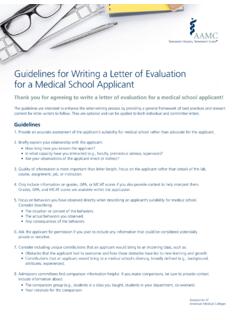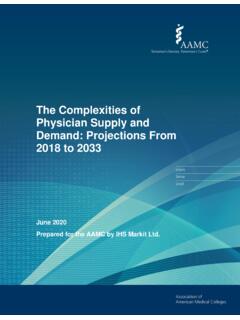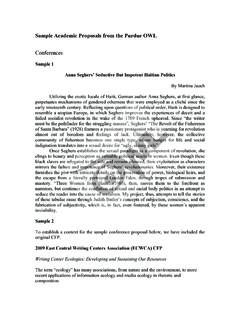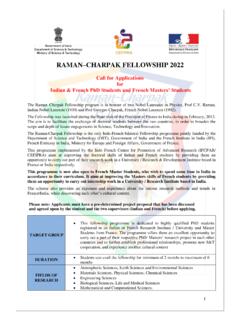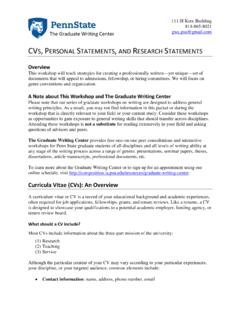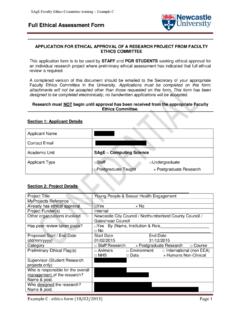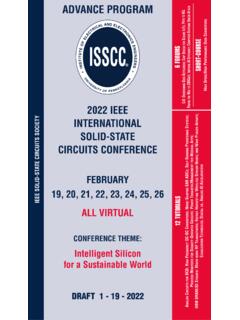Transcription of Workshop Preparation and Presentation
1 GWIMS ToolkitWorkshop Preparation and Presentation A Valuable Form of Scholarship for the Academic PhysicianGWIMS ToolkitAuthorsCarla , Professor of MedicineUniversity of Pittsburgh School of MedicineRachel , Professor of MedicineUniversity of Nebraska College of MedicineMelissa McNeil , of Medicine, Obstetrics, Gynecology, and Reproductive SciencesUniversity of Pittsburgh School of MedicineAbby Spencer , Professor of MedicineAllegheny General HospitalTemple University School of MedicineMegan McNamara , Professor of MedicineCase Western Reserve University School of MedicineGWIMS ToolkitWhat Is a Workshop ? A set of activities designed to promote learning, discussion, and feedback about a topic. Seminar emphasizing free discussion, exchange of ideas, and demonstration of methods of practical application of skills and principles. A brief, intensive course for a small group which emphasizes problem-solving. In the medical field, workshops typically take place during regional or national ToolkitObjectives:1)Describe the role of Workshop Presentation in the dissemination of scholarly work and )Provide a comprehensive blueprint for developing and presenting a successful )Outline ways to make your Workshop count twice (or ).
2 GWIMS ToolkitWhy Do People Attend Workshops? They provide a high-yield, interactive educational experience on an area of interest. Topics are typically applicable to attendee s professional development or clinical, educational, or research area of interest. Their learning format ismore efficient, effective, and enjoyable than a large-group lecture or self-directed reading on given subject. Allow for networking with ToolkitWhy Develop Workshops? Alternative to publication as scholarly activity. Provides presenter with teaching experience and develops national reputation. Enhances promotabilitywithin one s will examine each of these in more ToolkitWorkshop Versus Publication Less work than a publication Little up-front work, two hours at most to formulate a Workshop overview/abstract. Once accepted, development takes about 20 hours of time, split amongst multiple participants (usually 3-5). Compare that to many more hours for the writing, editing, submitting and re-submitting (and re-submitting ), and revising process involved in manuscript publication.
3 Often, less data needed than for publication Works in progress with preliminary data can be presented. Depending on the topic, NO DATA is acceptable! GWIMS ToolkitNational Experience Collaborate with other experts in your area of interest from around the country. Hone teaching skills in front of a (perhaps) more sophisticated audience. Establish a national reputation important for promotion eligibility. Take your local work and disseminate it ToolkitWorkshops and PromotionAccording to the AAMC guidelines for promotion of clinician-educators, evidence of scholarly work in teaching includes: Any activity that fosters learning, including direct teaching and creation of associated instructional materials. Lectures, workshops, small-group facilitation, role-modeling, precepting, demonstration of procedures, facilitation of online course, formative feedback. invited presentations ( Workshop ) related to teaching Presentation in a peer-reviewed or invited forum at regional/national Evaluations from a conference GWIMS ToolkitWorkshop Development: From Start to FinishGWIMS ToolkitStep 1: Choosing a Topic, Collaborators, and VenueGWIMS ToolkitWhat Makes a Good Topic?
4 Almost any clinical, educational, or research topic can be adapted to a Workshop format. Features particularly key to success: Presenters are passionate about topic (but not necessarily expert in). Topic is timely or potentially controversial. Topic aligns with meeting s educational objectives. Workshop provides opportunity for hands-on or skill-based practice or learning. Must be narrow enough to be covered in appropriate depth within time allotted Often 90 ToolkitPossible Topic Areas with ExamplesTopic AreaExamplesClinical Area of Interest Controversies in Gender-specific Cancer Screening ; Large-joint Injections Training-related Meeting Duty Hour Restrictions ; Improving Resident Efficiency in the Outpatient Clinic Setting Methodological Evaluation Tools for Curricular Projects ; Using Objective Structure Clinical Exams (OSCEs) to Evaluate Student Physical Diagnosis Skills Professional Development Understanding and Utilizing Web applications in Everyday Practice and Teaching ; How to Maximize Your Learning through Continuing Medical Education Personal/Professional Balance Maintaining Productivity in a Part-time Position ; Mentoring Trainees in Work/Life Balance Teaching Skills Use of Team-based Learning in the Pre-clinical Medical School Courses.
5 Developing Effective Web-based Instructional Tools Quality Improvement Improving Chronic Disease Management in Resident Continuity Clinic ; Strategies to Enhance Transitions of Care in the Inpatient Setting Health Policy/Advocacy Incorporating Health Policy Journal Club into Residency Training ; Examination of Advanced Care Organization Structure and Function Health Care Communication Non-verbal Communication Skills to Improve Patient Care ; Patient-centered Interviewing to Enhance Care in the Elderly OtherAny ongoing research project, curricular or practice innovation*not inclusiveGWIMS ToolkitFinding Collaborators Consider their working style, expertise, career stage, availability, and institution. Best bets are those: With whom you already share a good working relationship. Who have a particular interest or expertise in the topic. Who are at different stages of their careers Opportunity to give and gain mentorship. Who are willing and able to commit time and effort to the endeavor.
6 Consider those who work at other institutions: Opportunity to network in your field. Multi-institutional authorship appeals to many review committees if the abstracts are not ToolkitMeeting Venue Often dictated by one s specialty as many academicians attend the same one or more meetings each year. Also consider: Which venue are potential collaborators likely to attend? Does the Workshop I have in mind coincide with the meeting s educational objectives or theme? Does the meeting call for Workshop submissions or are presentations by invitation-only?GWIMS ToolkitSample List of National Meetings Offering Workshops*FieldMeetingMedical SchoolAssociation of American Medical CollegesGroup on Educational AffairsInternal MedicineAssociation of Program Directors in Internal Medicine Clerkship Directors in Internal Medicine Society of General Internal Medicine American College of Physicians PediatricsAssociation of Pediatric Program Directors Council on Medical Student Education in PediatricsAmerican Academy of Pediatrics Family PracticeSociety for Teachers of Family MedicineAssociation of Family Medicine Residency Directors Family Medicine Educational ConsortiumAmerican Academy of Family PhysiciansSurgeryAssociation of Program Directors in Surgery Association for Surgical EducationAmerican College of Surgeons FieldMeetingObstetricsand GynecologyCouncil on Resident Education in Obstetrics and Gynecology/Association of Professors of Gynecology and ObstetricsAmerican Congress of Obstetricians and Gynecologists RadiologyAmerican
7 Roentgen Ray SocietyAssociation of University RadiologistsRadiologic Society North AmericaNeurologyAmerican Academy of Neuromuscular & ElectrodiagnosticMedicineAmerican Academy of NeurologyAnesthesiologyInternational Anesthesia Research SocietyPost Graduate Assembly in AnesthesiologyAmerican Society of AnesthesiologistsPsychiatryAssociation for Academic PsychiatryAmerican Psychiatry Association *For more specific details regarding submission criteria, information can be found at individual society websites. All workshops are via submission with peer-review process unless noted with an which designates workshops are available by invitation ToolkitStep 2: Preparing the Workshop Submission: Structure, Abstract, and Learning ObjectivesGWIMS ToolkitWorkshop Structure Workshops should have both didactic and interactive components, and large group and small group activities The key to engaging the audience is variation! Didactic component is best for giving audience: Background information about topic.
8 Information needed to either participate in interactive component if done before or information that answers questions generated by interactive component if done after. Interactive teaching methods include, among others: Case-based format. Learning or skills stations. Question/answer sessions conducted by small group facilitator. Team-based learning format. Ratio of interactive:didacticshould ideally be about 3:2 or greaterGWIMS ToolkitWriting the Abstract The Workshop abstract or summary is essential for selling the Workshop to reviewers and for attracting audience members. Consult the meeting s submission guidelines and comply with them. Identifying a target audience by level of training ( student, resident/fellow, faculty ) or level of expertise with the topic ( beginner, intermediate, advanced ) may be ToolkitThe Abstract Should Focus on These Three Things1)Background information that highlights why topic is important to prospective )What the attendee can expect to happen?
9 How will the learning objectives be achieved? Stress the interactive portions of the )What the attendee can expect to take away? Knowledge and/or skills. Tangibles (resource material, handouts).GWIMS ToolkitExample: A Workshop on How to Do a WorkshopBackground excerpt: Why topic is important. Workshop Presentation outside of one s institution is increasingly recognized as an important form of scholarship. Workshops afford academic physicians the opportunity to share clinical, educational, scientific, and/or faculty development expertise to a wide audience. They support the development of a national reputation, enhance promotability, provide an opportunity to showcase and hone teaching skills, and may serve as a springboard for additional scholarly work. In addition, they foster collaboration and networking with colleagues within or between GWIMS ToolkitExample: A Workshop on How to Do a WorkshopBackground excerpt: What to expect. Participants will learn how to choose an appropriate topic and meeting venue and compose essential elements of a Workshop proposal including the proper construction of learning objectives.
10 Participants will learn how to effectively present their topic in an evidence-based manner, within the time allotted for a typical Workshop . The group will brainstorm ways to optimize audience participation and hands-on of this Workshop will work in small groups to design a Workshop from start to finish on a topic of common interest. GWIMS ToolkitExample: A Workshop on How to Do a WorkshopBackground excerpt: What they will take away. Workshops created during this session may be submitted to a future meeting if desired. All participants will leave with the skills needed to prepare and present their own workshops. Valuable hand-out materials outlining the process in detail will be disseminated. GWIMS ToolkitLearning Objectives Almost all Workshop submissions call for a list of learning objectives for the session. These should summarize what will the participant will be able to do after attending the Workshop . Use action words rather than passive descriptors. Objectives should encompass the main learning tasks of the Workshop for participants.






